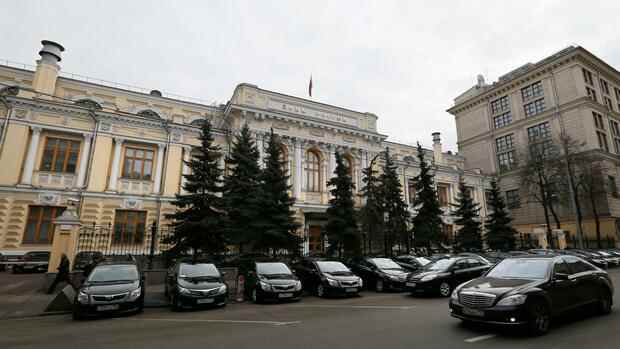Exterior of the Central Bank of Russia building.
(Photo: dpa)
Berlin, Brussels Rebuilding Ukraine will cost enormous sums. If the West has its way, money from Russia should also be used for this. According to the will of the EU Commission, the assets of Russian oligarchs could be confiscated more easily in future. Since the start of the Ukraine war, around ten billion euros in private Russian assets have already been frozen.
Also under discussion is tapping the frozen currency reserves of the Russian central bank. However, the G7 countries do not yet know exactly how much is actually in western accounts.
Expropriation without compensation could be possible in the event of war, but Germany and the EU have not yet been warring parties. “Confiscation of Russian assets may seem politically opportune, but it is legally daring,” says legal expert Richard Happ from the Luther law firm.
Because: Legally, there is much to suggest that the currency reserves of a central bank are subject to state immunity because they serve sovereign purposes. So they cannot be confiscated.
Top jobs of the day
Find the best jobs now and
be notified by email.
“However, it becomes difficult when you go into detail,” explains Happ. According to this, there are two international treaties that are supposed to regulate this issue: one from the United Nations from 2004, which is not yet in force, and a European convention from 1972, but with only ten contracting parties. State practice that can be used as a supplement is “rather thin”.
violation of customary international law
Legal expert Happ says: “If currency reserves are confiscated, you create very dangerous precedents.” In any case, a legal basis under international law is needed.
The Iran-US Claims Tribunal was created by an international treaty that both Iran and the US agreed to. The United Nations Compensation Commission, which regulates claims by individuals against Iraq because of the Kuwait War, was created by Security Council Resolution 687 of 1991 and thereby also legitimized under international law.
“If only Ukraine, the EU and the USA agree on the confiscation, that will not make it legal,” explains Luther’s lawyer Happ. “Russia and many other states would probably call this arbitrary vigilante justice.”
A lawsuit before the International Court of Justice (ICJ) of the United Nations would be difficult, as this always requires the consent of both sides. Lawsuits in state courts would probably also be difficult.
international humanitarian law
Russia would therefore have a very difficult time defending itself against the confiscation of foreign currency reserves. Happ says: “The Russian reaction would probably be to expropriate assets of foreign states and companies in Russia without compensation.”
Seizing reserves would be a violation of customary international law, agrees David Kleimann of the Brussels think tank Bruegel. One may only freeze property as long as an act contrary to international law lasts. After that you have to return it. In the US, too, it is currently illegal to confiscate foreign currency reserves as long as the country itself is not at war.
In EU circles, there are therefore also initial thoughts about making a deal with the Russian central bank: the EU could return part of the reserves if Russia agrees that the rest will be used for reconstruction in Ukraine.
Around twenty billion Russian reserves are stored in the EU
The figure of $300 billion in currency reserves, which is often mentioned in the discussion, comes from a calculation by the Bank for International Settlements from the summer of 2021. It is possible that the Russian government has brought part of the savings to safety before the invasion.
According to the EU Commission, around twenty billion euros in Russian currency reserves are stored in the EU. The reserves are usually held by the national central banks, such as the Banque de France or the Bundesbank. There they are invested in government bonds of the respective country.
However, there is almost nothing left at the Bundesbank at the moment, according to Frankfurt financial circles. Russia apparently withdrew the reserves in good time. In any case, there is still no legal basis for confiscating the reserves.
More: “Until victory!” – A day with Russia’s state television

